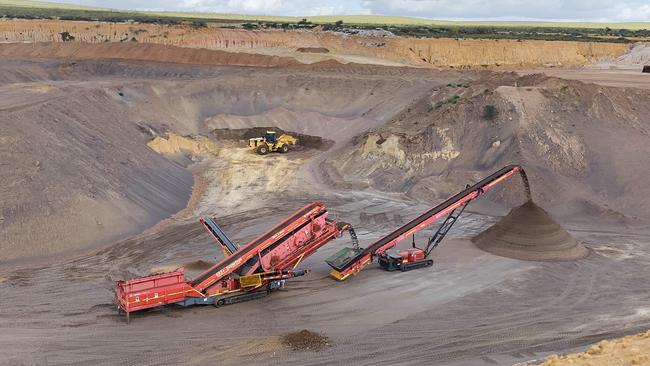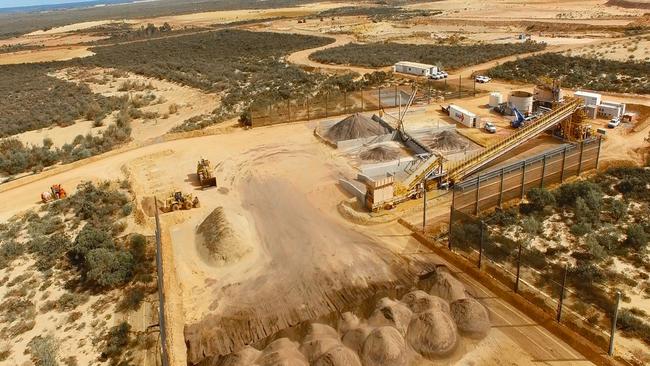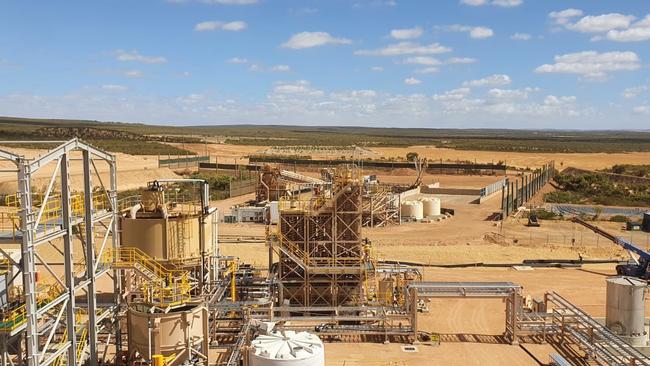Rare earth refinery at top end of expected costs, Iluka says
Iluka Resources always said it would only build a rare earth refinery if the federal government shared the financial risks. With a $600m blowout looming, will that agreement get up?

Iluka Resources says building its Australian rare earth refinery is likely to blow out to $1.7bn to $1.8bn, at the top end of previous estimates, as managing director Tom O’Leary warned the company won’t necessarily risk its own balance sheet to build a strategic asset.
The mineral sands miner slashed its final dividend to 4c a share on Wednesday, a pale shadow of its 20c payout a year ago, after persistent inflation, subdued demand, and higher costs hit the company’s core markets.
The group delivered a statutory net profit of $342.6m, down 42 per cent on the previous year. Mineral sands revenue was down 19 per cent to $1.24bn with earnings before interest, taxes, depreciation and amortisation down 32 per cent to $582m.
And Iluka’s 4c final dividend reflects only the pass through of funds received from its 20 per cent holding in Deterra Royalties, which holds a production royalty over BHP’s Mining Area C and South Flank iron ore operations.
While Iluka’s earnings and net profit both beat analyst expectations, the company’s market outlook remains cautious at a time it is ramping up capital spending on a new mineral sands operation at Balranald in NSW, and on its rare earth refinery near Geraldton in the Mid West of WA.
While the latter is being funded by $1.25bn federal government lending facility, the cost overhang remains a key issue for the company going forward, with Iluka still locked in discussions with the federal government over funding options for the additional cash needed to complete its construction.

Iluka updated the Eneabba refinery’s likely cost on Wednesday, saying its ongoing front-end engineering and design suggested the refinery was likely to cost $1.7bn to $1.8bn – up from a previous range of $1.5bn to $1.8bn. It was supposed to cost $1.2bn when Iluka made a final investment decision in 2022.
The refinery has been billed as both a plank in Iluka’s long-term growth and diversification strategy, and as a key strategic asset from a geopolitical perspective, designed to reduce the reliance of Australia and major allies such as the US on rare earth metals produced in China.
Rare earth prices have tumbled in recent months on slowing demand and an increase in Chinese production quotas in 2023. China also banned the export of rare earth extraction and separation technologies in December in a move seen as an effort to protect its dominance of the refining market.
Mr O’Leary would not comment on the details of discussions between Iluka and the federal government, but signalled the company’s reluctance to commit commercial debt to the project if further government loan facilities were not extended.
The Iluka boss said offtake deals with Northern Minerals, as well as progress on its own mineral sands and rare earth projects in NSW and Western Victoria, had added to the longevity of the refinery, which was initially designed to use feed from tailings at Iluka’s Eneabba former mineral sands mines.

But he said price incentives were still needed for the construction of non-Chinese refineries, even given project growth in demand for rare earth metals.
“On price, we’re all aware of Chinese dominance in the market. Again, that’s a factor we take into account in assessing risk adjusted returns around making a disciplined capital allocation to the refinery,” he said.
“So as we contemplate funding, both we and government are really cognisant of the risks of the project and also the strategic importance of the project – not only from a geopolitical and defence perspective, but also from the perspective of its contribution to facilitating global decarbonisation.”
But Iluka needed to weigh the refinery’s strategic importance in light of its responsibility to its shareholders, Mr O’Leary said.
“So while government and Iluka’s objectives are aligned around the development of the refinery, discipline around our capital allocation decisions has got to be maintained. And we’re discussing this broadly with government.”
Speaking to analysts on Wednesday Mr O’Leary would not comment on whether Iluka could pause or cancel development of the refinery if the federal government did not extend its loan facilities, but said the company could return to exporting a rare concentrate from Eneabba if the company were not to build the refinery.
“But that’s not something we are seriously contemplating at this point,” he said.
The Iluka boss flatly rejected suggestions the company could sell its stake in Deterra to fund the refinery shortfall, saying that would cost the company a valuable source of ongoing future revenue, and the resulting capital gains tax from any sale would make it a “very expensive form of capital”.
Iluka shares closed up 5.8 per cent at $7.63.




To join the conversation, please log in. Don't have an account? Register
Join the conversation, you are commenting as Logout